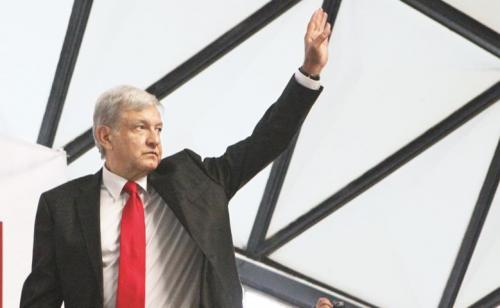The left could win in Mexico
With a traditional economic program, López Obrador has put the issue of the fight against corruption as the central axis of his governmental program.
- Análisis

Eight times already the left has reached the final stage of an electoral campaign in Mexico with the possibility of winning and, having almost won, their victory has been taken away by fraud. The State-party of the PRI (Institutional Revolutionary Party) survived two mandates outside of the presidency and then returned, and even though it has failed as a government and is thus weakened, it maintains its power to impose results by force, as has been demonstrated with the election of the government of the state of Mexico.
But the PRI can no longer do everything. Firstly, it has lost twice to its close cousin the PAN (National Action Party). Secondly, it is coming to these elections wasted by the failures of the government of Peña Nieto. They have shown their colors by choosing for candidate a typical neoliberal economist, external to the party, who worked for the PAN government and now lends his services to the PRI, but who is absolutely integrated among the business elites: José Antonio Meade.
From the other side of the same camp, PAN was able to impose the party’s president, Ricardo Anaya, as the presidential candidate in alliance with what is left of the PRD (Party of the Democratic Revolution) – that used to represent the left.
These two political machines, each with many provincial governors and large parliamentary contingents, are ready to put into action all this power to dispute between themselves who has the best chance of facing the leftist candidate, Andrés Manuel López Obrador.
López Obrador is launching his third presidential campaign, which means that he has occupied the center of the left space for at least twenty years, since he substituted Cuauhtémoc Cárdenas as the presidential candidate of Mexico for the PRD, and now stands for his new party, the Movement of National Regeneration, Morena.
A moderate candidate, he is described by the New York Times as closer to Lula than to Hugo Chávez, although, like any progressive candidate, the right classifies him as “Chavista” or “Bolivarian”. With a traditional economic program, he has put the issue of the fight against corruption as the central axis of his governmental program.
As on previous occasions, López Obrador is in first place in the opinion polls, enjoying the recall he holds among the electorate with respect to other candidates. He is thus the favorite victim of the attacks from the right and their media, although he is not boycotted so much as in other campaigns, simply because he is the favorite in the surveys.
Favorable symptoms for López Obrador include the adherence of businessmen and politicians linked to the PRI and the PRD, which is combined with the announcement of a possible moderate ministry. Both this and his alliance with a fundamentalist religious party have given rise to critiques within the left, but have not so far diminished his position as favorite.
Meanwhile, the indigenous candidate of the Zapatistas, María de Jesús Patricio, known as Marichuy, is having difficulties in obtaining the necessary signatures to register her candidacy. This could also favor López Obrador.
But the decisive element is the division and weakness of the two traditional parties. Peña Nieto failed as an alternative for renewal of the PRI. The PAN, even when allied to what is left of the PRD, has not shown sufficient strength to face López Obrador, although it appears to be the grouping that will receive a major part of the support of the Mexican right-wing, worried about an eventual victory of López Obrador. However, the principal adversary of López Obrador is fraud, which several times has prevented a left-wing victory in recent decades.
Whoever wins, even if not from the left, will have to face the stance adopted by Trump against Mexico and NAFTA, in addition to the issue of the wall and the expulsion of immigrants. Possibly the next president may have to turn to Latin America, reestablishing alliances, especially if Lula returns as President of Brazil.
With elections in Mexico, Brazil, Colombia, Venezuela, among others, 2018 may allow the left to recover the initiative and return in strength in the continent.
(Translated for ALAI by Jordan Bishop)
- Emir Sader, Brazilian sociologist and political scientist, is the Coordinator of the Laboratory of Public Policy with the State University of Río de Janeiro (UERJ).
Del mismo autor
- Hay que derrotar políticamente a los militares brasileños 07/04/2022
- China y Trump se fortalecen 04/03/2022
- Pandemia e Ucrânia aceleram decadência da hegemonia norte-americana no mundo 28/02/2022
- Pandemia y Ucrania aceleran la decadencia de la hegemonía norteamericana en el mundo 28/02/2022
- La anti-política generó la fuerza de extrema derecha 22/02/2022
- Las responsabilidades del PT 10/02/2022
- Estados Unidos, más aislado que nunca en América Latina 03/02/2022
- Memoria y olvido en Brasil 27/01/2022
- 2022: tiempos decisivos para Brasil y Colombia 05/01/2022
- Brasil: una historia hecha de pactos de élite 18/12/2021
